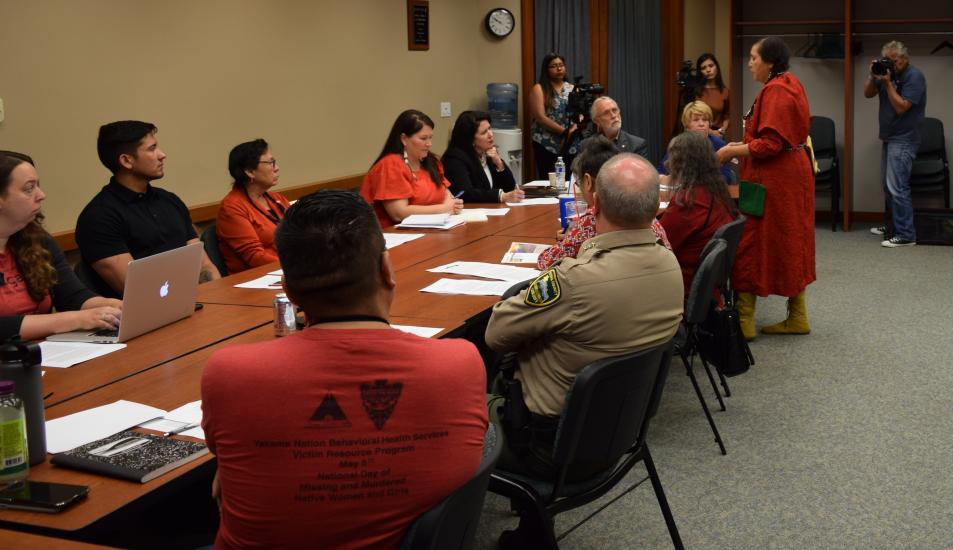Newhouse Requests Field Hearing on Missing and Murdered Indigenous Women

WASHINGTON, D.C. – Today, Rep. Dan Newhouse (R-WA) sent a letter to the leadership of the House Judiciary Committee and House Natural Resources Committee requesting a field hearing in Central Washington to discuss the crisis of missing and murdered indigenous women (MMIW) and Savanna's Act, legislation he introduced in May. Field hearings are an opportunity for Committees and Members of Congress to witness firsthand the issues of importance to different communities across the country and discuss legislative solutions.
The letter reads, "As your committees continue to discuss policies to address the MMIW crisis and consider holding legislative hearings on Savanna's Act, I must respectfully stress the importance of hearing directly from communities on the ground who have been harmed by this epidemic."
"Hosting a field hearing in Central Washington – particularly on the Yakama Nation Reservation – would be a meaningful opportunity to gather a diverse community of Tribal and law enforcement stakeholders to share their experiences on the front lines of the MMIW crisis and how legislative proposals, like Savanna's Act, would help communities serve justice for Native women and their families."
The full text of the letter can be found here and below.
Dear Chairmen Nadler and Grijalva and Ranking Members Collins and Bishop,
The crisis of Missing and Murdered Indigenous Women (MMIW) gained national attention after Savanna Lafontaine-Greywind, a 22-year old member of the Spirit Lake Tribe who was pregnant with her first child, was murdered in August 2017. Savanna's story is heartbreaking; and, tragically, her murder is not an isolated incident.
Native American and Alaska Native women face a murder rate ten times higher than the national average, with 84% experiencing some form of violence in their lifetime. Despite this disturbing and persisting trend, there is still no reliable way of knowing how many Native Women go missing each year because of outdated databases and a lack of coordination between law enforcement agencies. This is unacceptable.
To assist in curbing this epidemic affecting Native Women, I introduced Savanna ‘s Act with my colleagues Representatives Norma Torres (D-CA) and Deb Haaland (D-OK), to finally empower law enforcement agencies and tribes to effectively address this devastating issue that impacts communities in Central Washington and across the country.
As your committees continue to discuss policies to address the MMIW crisis and consider holding legislative hearings on Savanna ‘s Act, I must respectfully stress the importance of hearing directly from communities on the ground who have been harmed by this epidemic.
Indigenous Women in Washington have been particularly impacted by this crisis, with 71 MM1W open cases statewide, 31 of which occurring on or around the Yakama Nation Reservation. This data is only available due to the diligent reporting of the Yakima-Herald Republic, which has created an online hub that lists open cases involving missing and murdered Yakama Nation women, provides resources for the community to report a disappearance, and links to additional stories highlighting the community response to the crisis. It is with these statistics and community efforts in mind that I invite you to hold a field hearing in Central Washington on the MM1W crisis. Hosting a field hearing in Central Washington—particularly on the Yakama Nation Reservation—would be a meaningful opportunity to gather a diverse community of Tribal and law enforcement stakeholders to share their experiences on the front lines of the MMIW crisis and how legislative proposals, like Savanna ‘s Act, would help communities serve justice for Native Women and their families.
Thank you for your consideration and for your strong leadership and advocacy for our nation's Native communities. I look forward to welcoming you to Central Washington and to addressing this crisis that affects communities across our country.
Background:
Savanna's Act aims to address and bring awareness to the crisis of missing and murdered indigenous women by developing guidelines and best practices for law enforcement agencies across the country, improving law enforcement coordination, and enhancing reporting, record keeping, and communication for law enforcement and families of victims.
The legislation was previously introduced in the 115th Congress by Rep. Torres and Senator Heidi Heitkamp (D-ND). The Senate passed the bill unanimously, but it did not receive consideration in the House due to policy-related concerns. In January 2019, Senators Lisa Murkowski (R-AK) and Cortez-Masto (D-NV) reintroduced the bill in the Senate.
Reps. Torres, Newhouse, and Haaland worked together with the Senators to address previous concerns and develop improved language to introduce in the House of Representatives. The new bill builds on previous versions of Savanna's Act by expanding the requirement for the creation of law enforcement guidelines to all U.S. Attorneys, not just those with Indian County Jurisdiction, and requires such guidelines to be regionally appropriate. It also requires the Attorney General to publicly list the law enforcement agencies that comply with the provisions of the legislation. Finally, it includes a new implementation and incentive section that provides grant authority to law enforcement organizations to implement the provisions of the legislation and increases the amount of those grants for those in compliance.
Washington state is ranked second among states in number of cases related to missing and murdered indigenous women with 71 identified cases. Washington's 4th Congressional District is home to two federally recognized tribes, Yakama Nation and the Confederated Tribes of the Colville Reservation.